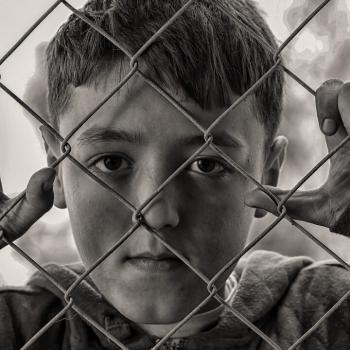
Adam and Eve expelled from the garden (detail). Michaelangelo, Sistine Chapel
Last month, Michael “Lepanto Institute” Hichborn made the lunatic claim that Judas Iscariot is “the patron saint of social justice.” In truth, it would be St. Martin de Porres. I wrote about it here and here; Mary Pezzulo wrote about it here and here; David Russell Mosley wrote about it here. And well before all that (I note for the record), Archbishop Chaput warned that the Lepanto Institute “sows division”. Vivat Chaput.
But in addition to the weirdness about Judas, Mr. Hichborn also denied the existence of social sin. In the awkward and inept fragments that are his hallmark, he wrote: “True social justice? Rejects the idea of social sin. There is no such thing.”
Really? No such thing, huh? How very odd, then, to find that Pope St. John Paul II defines social sin at some length in his apostolic exhortation on the Sacrament of Confession, Reconciliatio et Paenitentia. Has Mr. Hichborn not read it? Has he forgotten it? Sad. In that text (for on this blog I always seek answers direct from the Magisterial texts), the pope says that the “mystery of sin”
is composed of [a] twofold wound which the sinner opens in himself and in his relationship with his neighbor. Therefore one can speak of personal and social sin: From one point of view, every sin is personal; from another point of view, every sin is social insofar as and because it also has social repercussions. (15)
All sin is social, says John Paul II, in this regard: It wounds our relationship with our neighbor. No man is an island. Some are an Institute, but no man is an island.
This does not mean that sin is not personal at all; and it does not mean that “external factors” in a society are to blame for a person’s sins. That would be a misreading. The pope is clear in pointing that out.
Sin, in the proper sense, is always a personal act, since it is an act of freedom on the part of an individual person and not properly of a group or community. This individual may be conditioned, incited and influenced by numerous and powerful external factors. He may also be subjected to tendencies, defects and habits linked with his personal condition. In not a few cases such external and internal factors may attenuate, to a greater or lesser degree, the person’s freedom and therefore his responsibility and guilt. But it is a truth of faith, also confirmed by our experience and reason, that the human person is free. This truth cannot be disregarded in order to place the blame for individuals’ sins on external factors such as structures, systems or other people. (16)
That is important. Only an individual can be responsible for sin. “Social sin” does not mean that society sins, or that society bears the burden of guilt. What it does mean is that every sin, to one degree or another, has a consequence for others.
The pope speaks of three distinct meanings of “social sin.”
I. “To speak of social sin means in the first place to recognize that, by virtue of human solidarity which is as mysterious and intangible as it is real and concrete, each individual’s sin in some way affects others.” (16)
To sin is to wound not only yourself but a brother or a sister. It puts you out of right relationship with God, out of right relationship with yourself, and also out of right relationship with other human beings (who are themselves the image of God). In that way, all sin wounds the Christ in your brother or sister.
The pope expands on this thought:
Consequently one can speak of a communion of sin, whereby a soul that lowers itself through sin drags down with itself the church and, in some way, the whole world. In other words, there is no sin, not even the most intimate and secret one, the most strictly individual one, that exclusively concerns the person committing it. With greater or lesser violence, with greater or lesser harm, every sin has repercussions on the entire ecclesial body and the whole human family. According to this first meaning of the term, every sin can undoubtedly be considered as social sin. (16)
It is not just “society,” in the secular sense, that is wounded by each sin, but the society of the Church itself. The Body of Christ also bears the wound. Even to that extent alone, all sin is “social” in its effects.
II. “Some sins, however, by their very matter constitute a direct attack on one’s neighbor and more exactly, in the language of the Gospel, against one’s brother or sister. They are an offense against God because they are offenses against one’s neighbor. These sins are usually called social sins, and this is the second meaning of the term.
Murder or theft, for example, would fall into this category. Rape would, too. It is a sin, the pope says, “against love of neighbor.” It “applies to every sin against justice in interpersonal relationships.” (There’s that funny Church thing about justice again.)
St. John Paul II lists the kind of sins that are included:
Also social is every sin against the rights of the human person, beginning with the right to and including the life of the unborn or against a person’s physical integrity. [Euthanasia is one such sin. So too sex reassignment surgery. Or a vasectomy.]
Likewise social is every sin against others’ freedom, especially against the supreme freedom to believe in God and adore him; social is every sin against the dignity and honor of one’s neighbor. [Bearing false witness counts here: the sins of detraction, rash judgment, and calumny.]
Also social is every sin against the common good and its exigencies in relation to the whole broad spectrum of the rights and duties of citizens. The term social can be applied to sins of commission or omission—on the part of political, economic or trade union leaders, who though in a position to do so, do not work diligently and wisely for the improvement and transformation of society according to the requirements and potential of the given historic moment; as also on the part of workers who through absenteeism or non-cooperation fail to ensure that their industries can continue to advance the well-being of the workers themselves, of their families and of the whole of society.
An employer sins against the common good when he fails to pay a just wage. An employee does so when he fails to report to work on time every day with no good reason.
III. “The third meaning of social sin refers to the relationships between the various human communities. These relationships are not always in accordance with the plan of God, who intends that there be justice in the world and freedom and peace between individuals, groups and peoples.”
Here the pope is thinking of such things as “the class struggle.” “Likewise,” he says, “obstinate confrontation between blocs of nations, between one nation and another, between different groups within the same nation: all this too is a social evil.” Racism would count as a social sin in this sense, as would slavery. The nuclear arms race is a social sin.
But once more the pope is at pains to point out that only individuals can sin.
Now it has to be admitted that realities and situations such as those described, when they become generalized and reach vast proportions as social phenomena, almost always become anonymous, just as their causes are complex and not always identifiable. Hence if one speaks of social sin here, the expression obviously has an analogical meaning. However, to speak even analogically of social sins must not cause us to underestimate the responsibility of the individuals involved. It is meant to be an appeal to the consciences of all, so that each may shoulder his or her responsibility seriously and courageously in order to change those disastrous conditions and intolerable situations.
This leads the pope to state even more clearly what social sin is not.
Having said this in the clearest and most unequivocal way, one must add at once that there is one meaning sometimes given to social sin that is not legitimate or acceptable even though it is very common in certain quarters today. This usage contrasts social sin and personal sin, not without ambiguity, in a way that leads more or less unconsciously to the watering down and almost the abolition of personal sin, with the recognition only of social guilt and responsibilities. According to this usage … practically every sin is a social sin, in the sense that blame for it is to be placed not so much on the moral conscience of an individual, but rather on some vague entity or anonymous collectivity such as the situation, the system, society, structures or institutions.
It is important to point this out in any discussion of social sin. It often happens that those who claim that there is “no such thing” as social sin have only the false usage in mind; they do not acknowledge, or they do not know, that there is a true one.
As the Church uses the term, “social sin” can have any one of the three senses John Paul II specifies. But it does not mean that there is no such thing as personal sin; and it does not mean that “the system” or “society” or “institutions” have sinned or bear guilt. Only individuals sin. Only individuals have guilt. “Social sin” is sin against community and neighbor; it is not the sin of “society.”
As St. John Paul II further says, even when the Church speaks of sins in terms of “collective behavior,” “she knows and she proclaims that such cases of social sin are the result of the accumulation and concentration of many personal sins. … The real responsibility, then, lies with individuals.” And the solution to that is always conversion and the changing of hearts:
At the heart of every situation of sin are always to be found sinful people. So true is this that even when such a situation can be changed in its structural and institutional aspects by the force of law or—as unfortunately more often happens by the law of force, the change in fact proves to be incomplete, of short duration and ultimately vain and ineffective—not to say counterproductive if the people directly or indirectly responsible for that situation are not converted.
Segregation was a social sin, but it was a social sin of many accumulated acts of individual racism. In order for segregation to end, it was important to change laws. But consciences needed to change too.
And the same is true, by the way, about abortion. Abortion is another grave social sin. It is important that we work to change the laws. But changing laws will be, in John Paul II’s words, “ultimately vain and ineffective” unless we also convert souls.
Only when a soul is converted are social sins reduced.
















